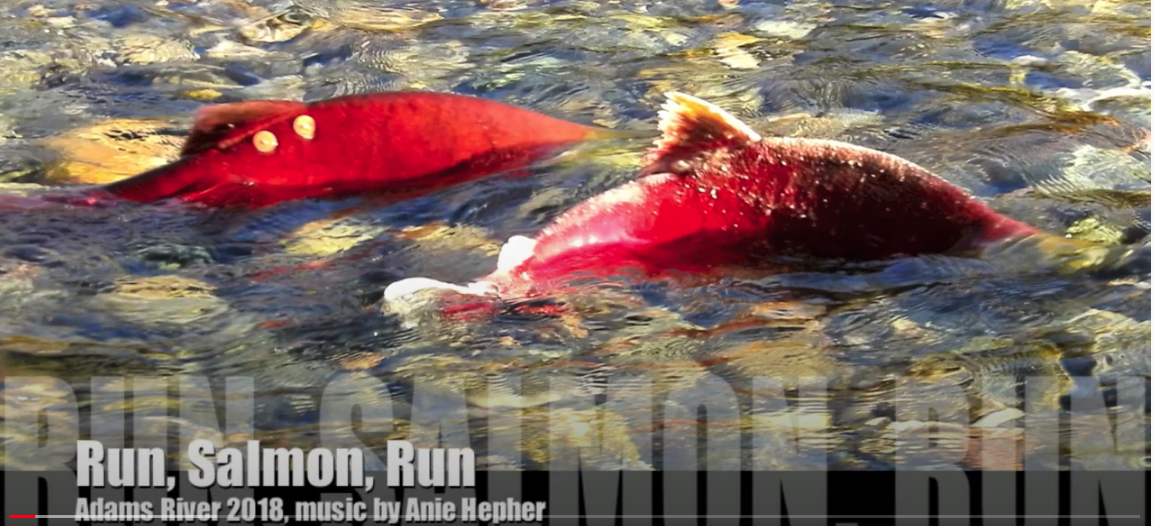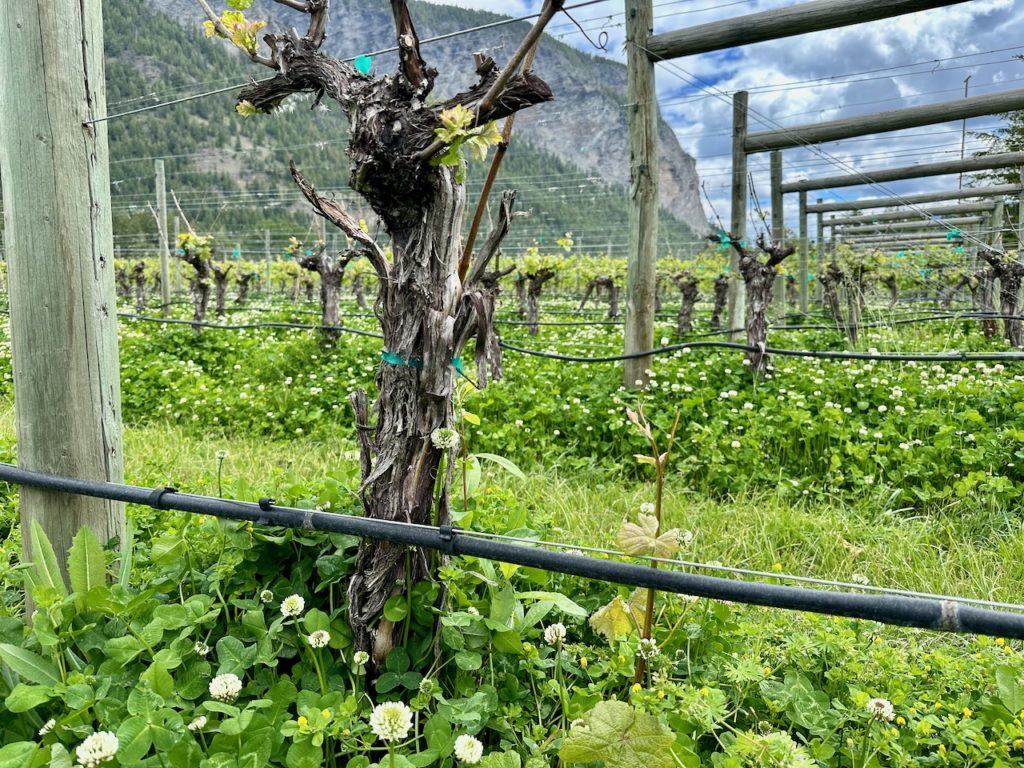
With climate chaos, the only certainty is uncertainty, as along with the heat, drought, and atmospheric rivers, extreme weather events now include very cold temperatures. Climate scientists have long predicted the global warming now that is now increasing yearly, but until five years ago, there was nothing written about the unstable polar vortex that has been bringing arctic air south. This is because the polar region is warming four times faster than more southern latitudes, which is destabilizing the jet stream thus causing unusual weather patterns.

Ironically, it was the slowly warming climate that has made it possible for grape production to move farther north into the Shuswap and Thompson regions and now this relatively new agricultural industry is at threat due to what is now a very unstable climate. There are six wineries here and all of them suffered losses due to an extreme cold snap in December 2022 and another one in January of this year.
At the Larch Hills Winery, which began in 1997 and is the Shuswap’s oldest, they are celebrating because 95 percent of their vines pulled through. There is damage however and the yield will be minimal this year, so they are planning to get a commercial licence that will allow them to import grape juice. They also plan to expand soon by planting a more frost hardy variety, Marechal Foch.
Recline Ridge Winery is in the Tappen hills and was established in 1998. The damage to their vines from the two cold snaps is extensive and thus there will be no crops this year. However, most of the vines survived and they are waiting for an expert to provide a technical assessment. Fortunately, they have plenty of wine left from previous years and they are looking forward to serving both tourists and local wine connoisseurs this summer.
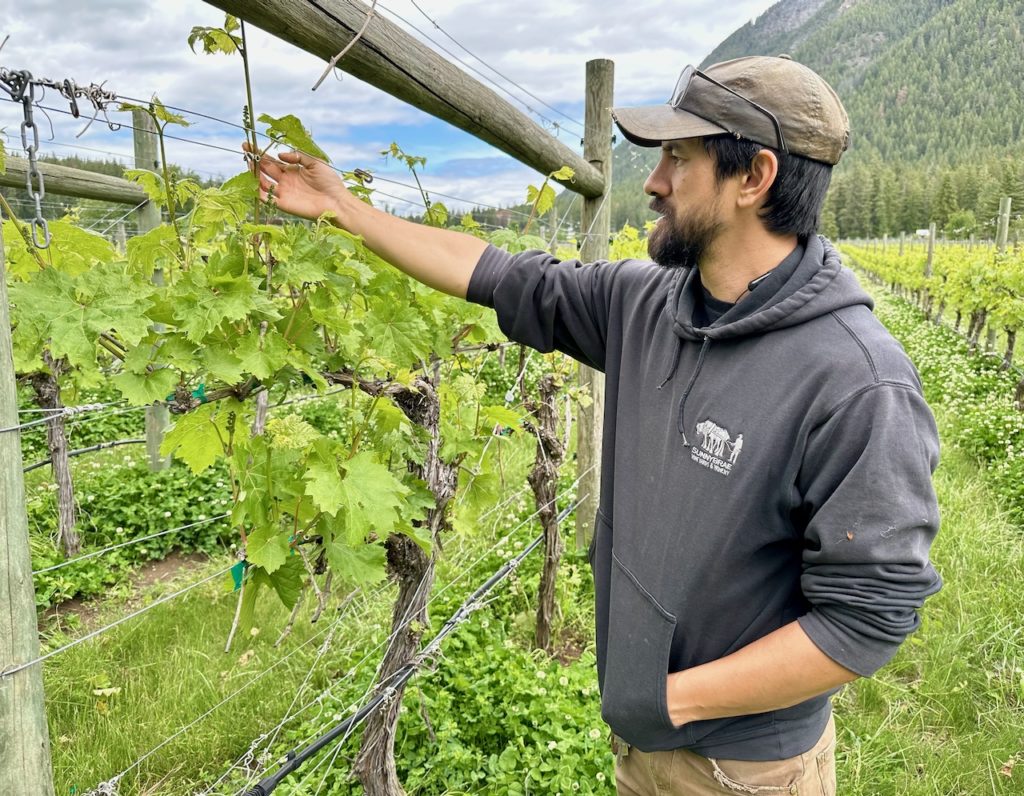
At the Sunnybrae Vineyards and Winery their 7.1-acre vineyard that was mostly planted in 2006 takes advantage of the lake effect that brings warmer air in the winter. Thus, while the two years of severe cold events did damage the vines, most survived. Fortunately, many of their vines are the winter hardy Marechal Foch and these survived fully intact, but they will not be able to fully assess the damage to the rest of the vineyard until mid-July.
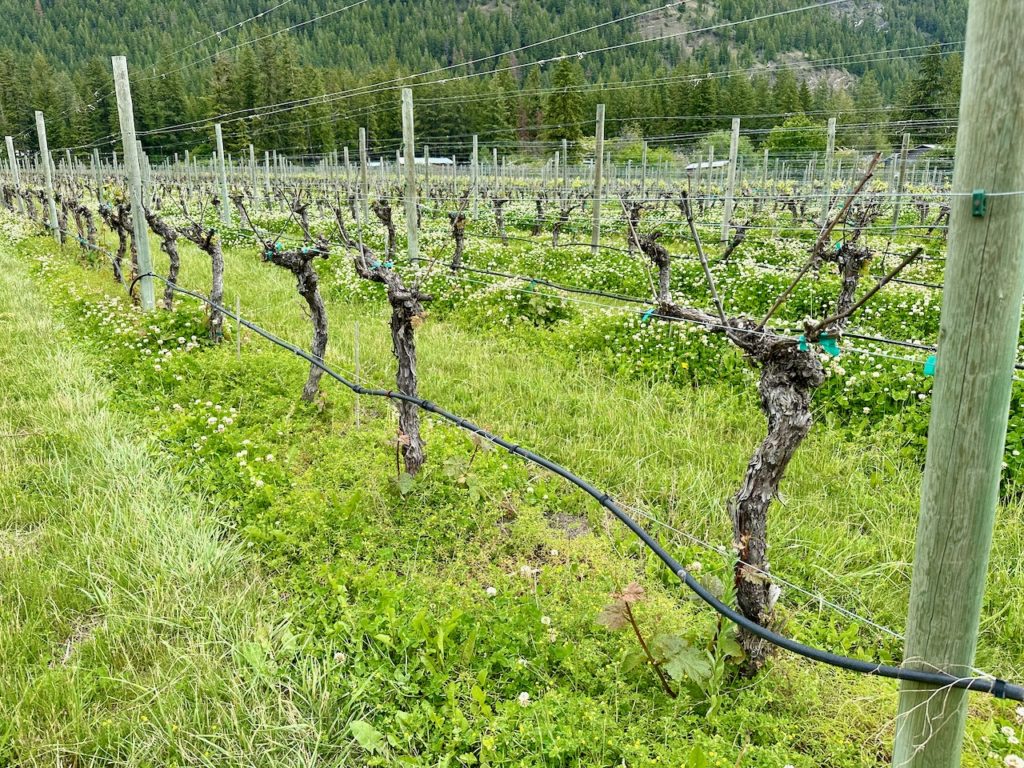
When I recently visited the vineyard, Sunnybrae winemaker and vineyard manager James Clark gave me a tour. It was good to see both their healthy vines and some flowers present on the vines that suffered damage. This spring has been cool, so the buds are opening later and thus it is still too early to fully determine the damage, but their yield this year will be much lower. As James explained, “Most vineyards are celebrating if there is life.”
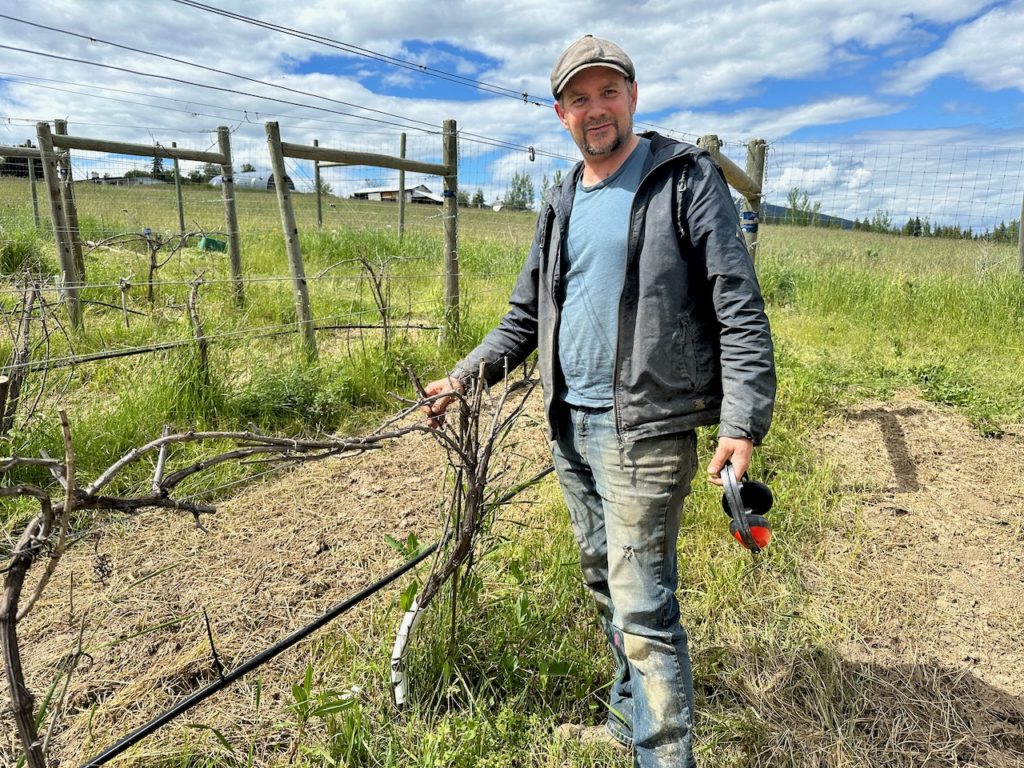
I also visited the Marionette Winery in Salmon Arm that was established in 2012 where some grape varieties were hit harder than others. There will be a small harvest these year from the hardier grape varieties, while the Pinot Blanc grape vines will need to be replanted. Winemaker and vineyard manager Jamie Smith spoke about how they plan to replace the dead vines with more sustainable varieties including Seval Blanc and a red grape, Rondo which are fine wine producers in other cool climate regions. Fortunately, the BC government has funding available for replanting. However, there is a need to remove the restriction on importing grape juice from Washington State, to ensure wineries are able to continue producing products while their vineyards recover.
This year, in addition to their expected smaller harvest, Jamie plans to purchase grapes from other vineyards, including those on Vancouver Island and Ashby Point Vineyard in Sunnybrae owned by Jim Wright where there was a better survival rate due to the lake effect. They have plenty of plenty of bottled wine for this year, their winery is open, and they have many live music concerts scheduled.
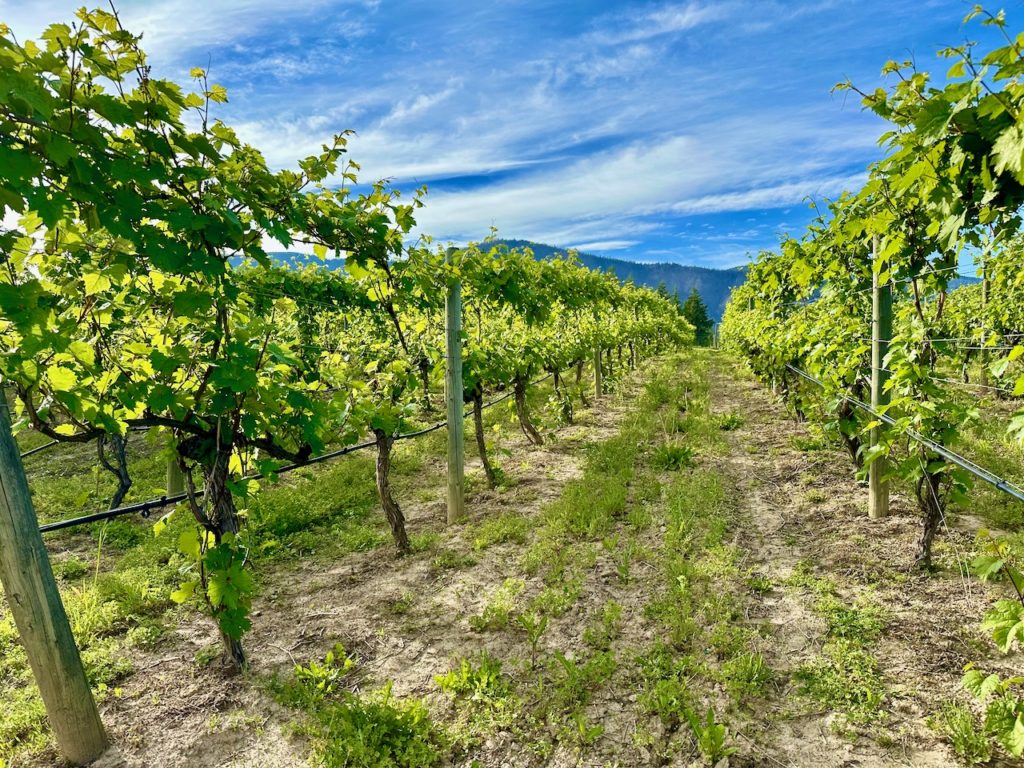
The first vines were planted at the 80-acre Celista Estate Winery vineyard in 2002, where Jake Ootes has produced award-winning wine. Many of their vines suffered bud loss from the 2022 cold snap and these were damaged again this January. Their hardier red varieties produced a crop last year; however, the grapes were severely damaged from last year’s wildfire smoke. Jake is hopeful for a good harvest this year from his red varieties and he has been working with other wineries to lobby government to temporarily purchase northwest U.S. grapes. Fortunately, Celista has a bountiful reserve of bottled wine, and they are open now for the summer and have some music events planned for their patio.
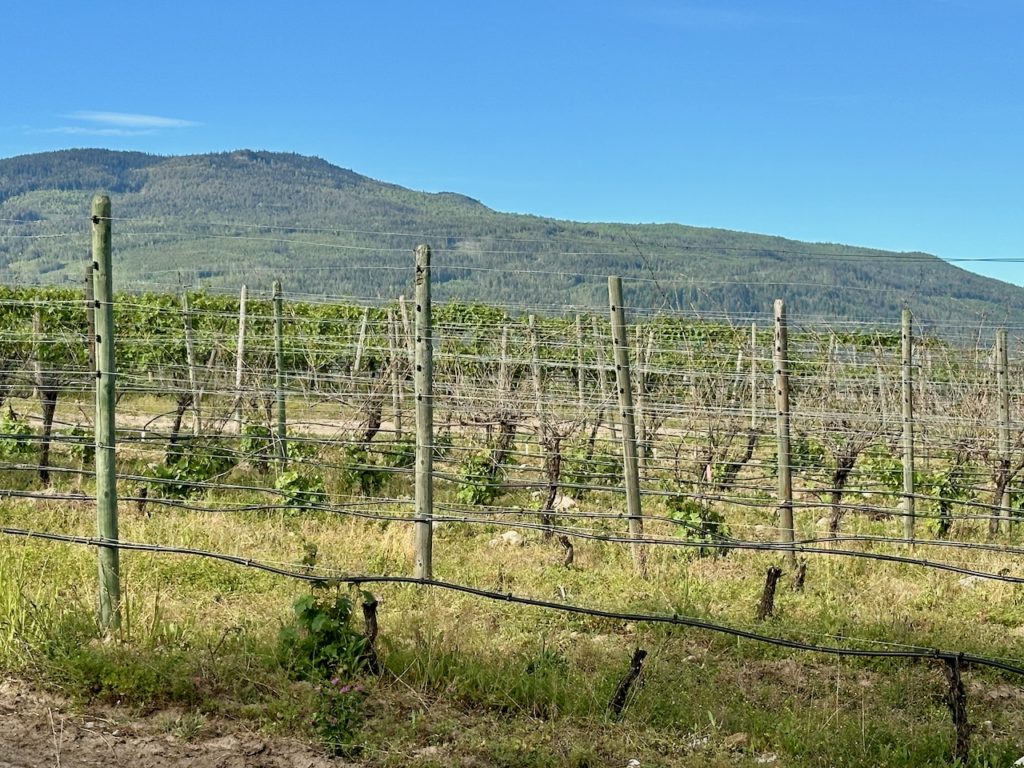
Overall, the Shuswap appears to have fared somewhat similar to the Okanagan, where there was upwards of 97 to 99 percent loss due to both bud and vine damage and where many vineyards are removing their vines. Wine producers will be taking advantage of the federal government’s $177-million and the provincial government’s $70-million support programs, but this is far short of the up to the estimated $317 million needed to successfully replant thousands of acres of vineyards. One might wonder if this expenditure is worthwhile, given the uncertainties ahead with climate chaos.
POSTSCRIPT
Damaging cold snaps may not be the only weather problem that vineyards, orchardists and farmers may have to face in the future, as intense drought is another crisis facing agriculture. The Okanagan is already a dry region and less rain and and snow could lead to water shortages that could cause more grief for growers. Fortunately, the Shuswap is not as dry, yet for any farmer that depends on rain, drought could be a major issue.
Most of the frost damage at Shuswap vineyards has killed the main stocks of the vines, but the root stock is still alive and new shoots are pushing new shoots from the base. Vineyard manages will train this growth this year to the trellis height and prepare these for an entire season of growing next year when they may even get some grapes. The next step will be to select the strongest new leg and cut off the old trunk. This will leave a healthy vine above ground and a more extensive, established root system underground. Although not ideal, this method will preserve established root systems and hopefully result in a life for these vines , unless of course there are more damaging cold snaps.
Learn more about how vineyards are coping with the frost damage (click on the headline):
The future of B.C. wine has never been more uncertain in the Narwahl
John Pomeroy Has Seen the Okanagan’s Hotter, Drier Future in The Tyee
More insight on the problems from James Clark: The Shuswap vineyards all grow a unique selection of “cool climate” vitis vinifera which are rarely found in the Okanagan (eg Siegerrebe, Ortega and Kerner, which Sunnybrae, Recline, Celista and Larch Hills all produce). These ripen earlier and are better suited to our shorter season (less growing degree days) and were selected specifically to suit the climate at the time. The Island also produces these grape varieties as they share a similar climate. We cannot produce the same varieties as the Okanagan (eg. Riesling, Pinot Gris, Merlot, Can Sauv, Cab Franc). The similarity we do share now, is that all regions (Shuswap, Okanagan, Thompson and more) are experiencing more extreme cold snap temperatures and for a longer duration of time. That said, some news going around is that the 2 years of back-to-back winter damage does not necessarily mean we will experience this every single year.
Learn more about Shuswap’s wineries (click on the name to go to their websites):
Celista Estate Winery, Sunnybrae Winery, Marionette Winery, Recline Ridge Winery, Larch Hills Winery, Waterside Winery (the Ovino Winery at Yankee Flats is permanently closed)
Grapes are not the only crop that has been hit hard by recent damaging intense cold snaps, as all the stone fruit trees were also damaged, including peaches, plums, nectarines, cherries and apricots. Here is the media release by the B.C. Government about their funding program to assist growers with replanting:

More B.C. farmers producing grapes, cherries, tree fruit and berries will receive support to replant their vineyards, farms and orchards to make them more resilient to climate change, strengthening the province’s economy and food security.
“There are few things better than locally grown fruit and locally crafted B.C. wine,” said Premier David Eby. “We’re taking action to support farmers who have been hit hard by a changing climate with a new task force and replant program, which will help about 1,000 more growers revitalize their farms and protect their businesses. The security of our food and our economy depend on the strength and resilience of our farmers.”
A new enhanced replant program will provide as much as $70 million in support to help producers replace damaged, diseased and low-producing vines, plants and trees with climate-resilient varieties that produce in-demand, premium fruit.
“Our government is here for B.C. producers who are facing challenges from severe vine and orchard damage from extreme weather, as well as those impacted by pests, plant disease and changing consumer and market demand,” said Pam Alexis, Minister of Agriculture and Food. “This historic investment will help producers replant for a changing climate with more support than ever before, which will strengthen our economy and ensure people can enjoy B.C. fruit and wine into the future.”
The new funding builds on the $15-million Perennial Crop Renewal Program launched in spring 2023, which has helped more than 200 producers remove diseased and unproductive plants and replace them with higher quality crops.
JMC Farms in Chilliwack received $70,000 to remove 14 acres of Elliot blueberry plants infected by scorch virus and revitalize the soil to prepare for replanting.
“The crop-renewal program was easy to apply for and allowed our farm to avoid a serious financial burden from the removal of our blueberry plants,” said Marc Dalton, owner and blueberry farmer, JMC Farms. “The program helped our farm to be set up so we could adjust to changing market and climate conditions and allow us to be successful in the future. I am pleased to see the program will be expanded to include more replant costs since it provides good value to support farmers.”
Government staff will work with industry associations to develop planting guidelines to ensure replanted varieties have enhanced adaptability and performance in the face of climate change, pests, disease and market pressures. Producers will make replant choices based on the best available agronomic science to ensure they can handle extreme-weather events. Application information will be made available as soon as the guidelines are established.
As part of this investment, government is also establishing a B.C. wine-grape sector task force to develop a research and varietal road map for an economically viable B.C. wine-grape industry. The task force will run for two years and provide practical recommendations to producers and the industry about how to remain profitable and resilient. It will be comprised of Canadian and international experts with members anticipated to be identified this year.
“Minister Alexis’s announcement today is confirmation of this government’s commitment to resiliency support for B.C. wine growers,” said Miles Prodan, president and CEO, Wine Growers BC. “The ongoing climate change effects on B.C. farmers, highlighted by recent freeze events, is real and directly impacts individuals and families that make up our industry. We look forward to working with the ministry to ensure B.C. vineyards come back better than ever to continue to produce the quality wine consumers have come to expect and that the B.C. wine industry continues to be a significant driver for the B.C. economy.”
Additionally, the Ministry of Public Safety and Solicitor General is working with manufacturers, with a specific focus on wineries, to support better experiences for visitors and promote tourism. In response to industry feedback, the Province is working to implement a suite of policy changes to enhance visitor experiences at wineries and other liquor-manufacturing sites in time for the summer. This work was informed by in-person visits to more than 30 liquor manufacturers.
“Our government remains committed to partnering with B.C. wineries and grape growers to guarantee the long-term sustainability and success of an industry that forms a fundamental part of the province,” said Roly Russell, Parliamentary Secretary for Rural Development. “We know what a difficult time the last few years have been. These improvements for the sector will help give our B.C. wineries more flexibility to deliver the tailored and world-class visitor experience that they provide.”
The new changes in development include:
- supporting better guided-tour experiences that allow people to sit and enjoy a glass of wine while on a tour;
- allowing sales in more places on site, including on tours;
- allowing more flexibility around sampling so manufacturers can customize sampling experiences; and
- allowing manufacturers to sell their product in picnic areas and host people more effectively.
Quick Facts:
- The new investment in a provincial replant program is in addition to the crop insurance and AgriStability income-protection programs the federal and provincial governments operate to support farmers who experience crop losses and income declines.
- It is estimated that B.C. berry, grape and tree fruit growers received more than $65 million through crop insurance and AgriStability in 2023.

